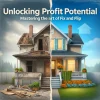
Socially Conscious Investing: How to Start a Sober Living Home
todayMarch 13, 2024 117 7

Fairly often, people hit me up for advice on opening and running a recovery house. What they may not realize is that it could be considered another form of special needs housing.
“My journey with special needs housing began almost 25 years ago. At that time, I was providing low-income housing through government Section 8 programs, which provide subsidies for those of low income due to various reasons, including disability.
My second experience came from working with folks who utilized Community Action either for emergency housing or for down payments or rent, often due to a distressful situation, such as being homeless with children or being a battered parent or spouse with children.
But my third experience, which led me to owning and operating a drug and alcohol (privately owned) recovery house, happened pretty much by accident. My oldest son was in recovery, and he was asked to manage a house for the owner of several recovery houses in a nearby county. This is where my son had gotten well after having a long run of multiple attempts at recovery with little previous success.
The second part of the perfect storm was that my wife and I were looking to downsize from our primary residence, mostly for lifestyle reasons, but the real estate market had already tanked. So, we both took some chances and decided we would open up our own recovery house with our primary residence, especially since there was a drastic shortage of facilities in our area.”
What is a sober living home?
Sober living homes offer safety and support for people who are recovering from drug or alcohol abuse. These are homes where you live in a substance-free environment while navigating the responsibilities of the real world. These types of homes allow you to be substance-free, but you still have to deal with everything you would deal with in the real world so that you don’t fall into a sense of false security.
All successful sober living homes have rules and regulations that you must follow to live there, and while these rules may vary, the general guidelines are usually the same no matter where you go. Sober living homes, also called recovery houses, are group residences. This means that you live with a large group of people, all of whom are recovering from some form of addiction. Residents must remain sober while living in the house and comply with any drug testing requests.
The owners of these types of homes are usually private, but charities and businesses may also own sober living houses. Most homes are located in residential neighborhoods. If you live in a sober living home, you may have your own room or have a roommate, depending on the size of the home and the number of people the house takes in at any time.
How to start a sober living home
The first thing you need to do to start a sober living home is write a business plan. You need to describe the type of residence you want, detail how many residents you plan to allow into the home, and provide a nice list of similar operations in the area where you are hoping to open a home. Doing all of this allows potential investors or lenders to decide whether you’ll have too much or too little competition. Having too little competition means that you might be required to take in more residents than you can accommodate.
You’ll also need to obtain an IRS employer identification number.
Calculate the overhead costs
In your business plan for your sober living home, you should also explain how you plan to attract residents, what you will charge, what services you provide, and how to gather operating capital. You should also plan to calculate the overhead cost, even if it’s just an estimate. This shows that you know how much it costs to run a residential home for sober living.
Research the licensing, regulations, and zoning laws
When you consider opening up any kind of residential home, you have to research zoning laws in your area. You must rent or purchase a dwelling, and it needs to handle the number of people you want to house. Oftentimes these areas are residential in nature, and you might face backlash from the community when you try to start a sober living home in their neighborhood. However, with regard to community backlash, the federal Fair Housing laws and the Americans with Disabilities Act are on your side and protect people who need to live in sober living homes. You do not need a license or certification to open a sober living home, but some states require voluntary certification processes to be met first.
Establish resident criteria and find a house manager
Sober living homes are usually male-only or female-only; rarely do they house both genders. By establishing this, you are setting the guidelines for who can stay in your sober living home.
You need to invite a person of the appropriate gender to be the house manager to help run the house, and in situations where you have combined genders, you might want to have two house managers to even out the gender ratio. The house manager should be sober for six months to a year, and you should contract with that person for an established period of time. It’s a good idea to offer a promotion from resident to house manager after a resident has met a specific period of time sober. This gives them the motivation to continue to be sober. You must pay house management. Often their lodging is free, and so are their meals, but this does not negate the need to pay them.
You should be able to determine if a person should reside in your house. You should list the information an individual will need to provide during the application process, which can be anything from identification to proof of residency and references.
Promote and market your sober living home
You need to ensure you are promoting and marketing your sober living home for what it is. You don’t want to be misleading, and you don’t want people who do not fit the criteria to live in your home to reach out to you. It will take up a lot of your time to go through application processes only to find out the person doesn’t fit your needs—or, more accurately, that you don’t fit their needs.
The challenges of owning a sober living home
Once we had the buy-in of me as owner and my son, who had lots of experience with recovery, as a manager, the rest was the easy part. Having a good property, location, and furnishing a place might not seem like the easy part to the typical real estate investor, but it is. The hardest part is having a good manager, culture, and reputation.
It also helps to have a big “why.” That’s what keeps you going during the tough times. Most real estate investors have dollar signs in their eyes when they think about renting beds out, but there’s also a lot of responsibility and liability that can go along with it. Personally, my son and I don’t really do it for the money, as there are much easier ways to make a buck.
In the beginning, besides filling up the house, the biggest challenges for us were the township and neighbors. Everyone thinks a recovery house is a good idea as long as it’s not next to them. The truth of the matter is that we never really have had any criminal problems.
The types of issues we usually have are things like an uptick in turnover or someone breaking the house rules. Occasionally, though, we do lose a resident or former resident, and it’s a grim reminder of the life-and-death battle being fought out there on the streets in terms of addiction.
Another challenge for us is the enabler in the addict’s life—usually a parent or spouse—who inhibits the resident’s recovery. The most common traits I see in a typical resident are selfishness and a lack of maturity. We have been times when we had to tell a parent that they needed to let Junior grow up and stop calling the house.
The benefits of owning a sober living home
There is some light at the end of the tunnel, though, just in the fact that you never have a complete vacancy. Residents also do chores, like maintaining the grounds and shoveling snow. There is some wear and tear on the home, but usually, someone at the house is handy in a trade. For example, some residents have been chefs, plumbers, electricians, and so on. Also, residents can span anywhere from age 18 to 65 and are from every walk of life.
By far, the best part about owning and running a recovery house has been what it’s done for my son and me, as it’s probably one of the most rewarding things I’ve ever done in my life. I’ve had people come up to me crying and saying that my son or I have saved their life, their child’s life, or their spouse’s life—and it’s very hard to put a price on that.
Nothing is better than to see a resident or former resident move on, land a good job, get married, buy a house, or even start a business. It’s one of the greatest feelings of accomplishment in the world.
Many of us know someone struggling with addiction and feel like we would like to do more to serve this community. So, if you are contemplating opening some type of drug and alcohol recovery house, a great resource when starting is the Oxford House website, where you can learn more about running recovery houses in general.
Embark on your journey to real estate success today by exploring our upcoming events and immersing yourself in a community dedicated to education, growth, and prosperity.
Written by: ericcounts
Previous post

- 37
labelReal Estate todayMarch 12, 2024
Navigating the Path to Homeownership: Mastering Your Portfolio Returns
Navigating the Path to Homeownership entails meticulous financial planning, with one crucial aspect being the evaluation of your investment portfolio. Understanding how to calculate portfolio return is paramount for ensuring [...]
Similar posts

- 1
labelReal Estate todayMarch 7, 2025
Did You Get a Tax Refund?

- 32
labelReal Estate todayAugust 8, 2024
What Is a Lien in Real Estate?
Copyright 2021 REIE.INFO




Post comments (0)